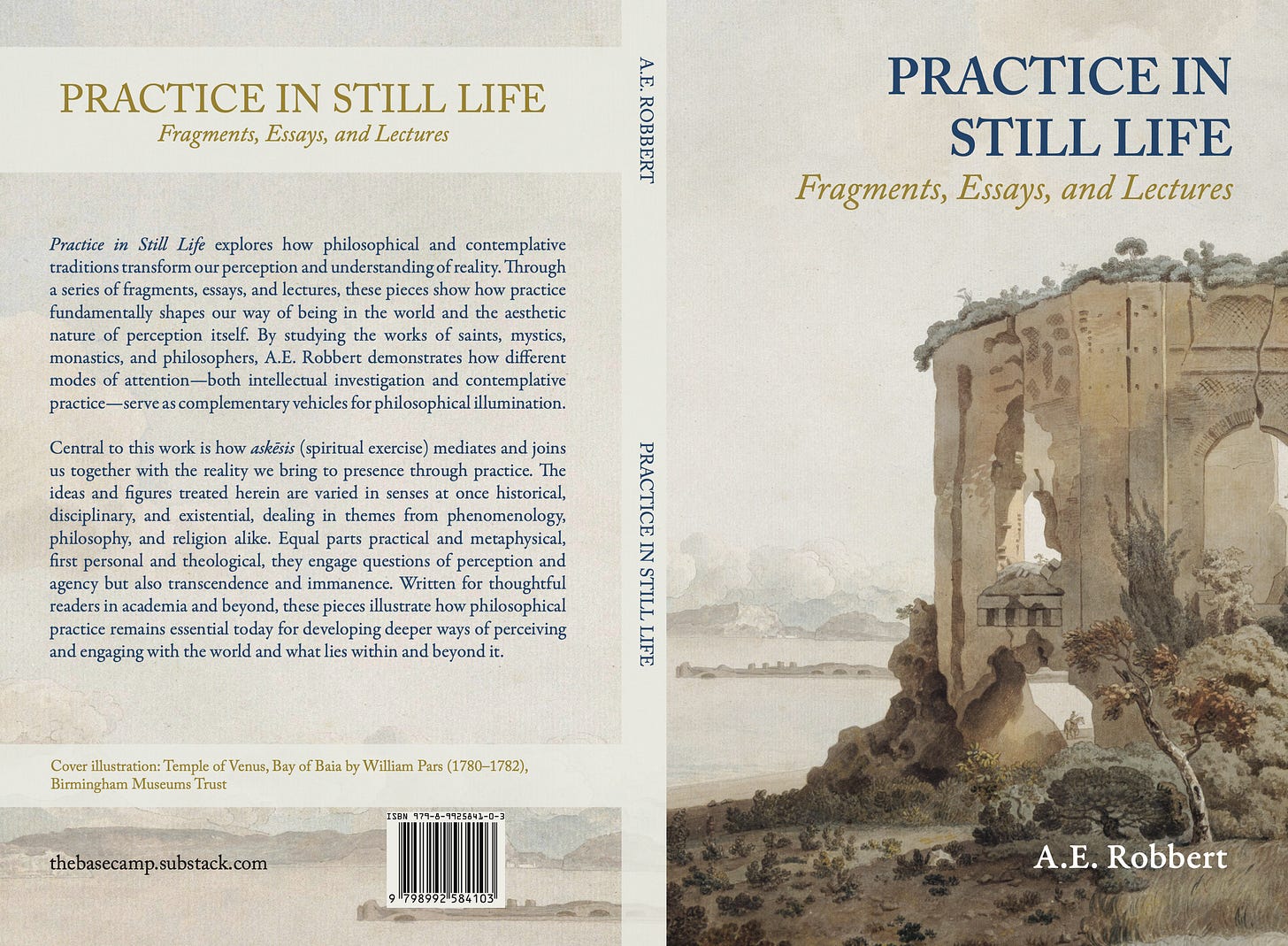Field Notes and Updates
New podcast interview, Second Voice essay, upcoming talk in Berkeley, CA, and recent essay responses

Dear readers,
This week I want to share a few updates that may be of interest—especially for new subscribers. The Base Camp has grown steadily over the past month, with around 1,600 regular readers now gathered around this shared space for philosophical reflection and writing. If you’ve recently joined, welcome.
This update includes info about a new podcast conversation, a new essay of mine published in Second Voice, details on an upcoming public talk, and a few responses to some recent writing I posted here.
Thank you, as always, for reading and for thinking along with me here.
Sincerely,
Adam
New Artifacts
Hermitix Podcast — I sat down with James de Llis for the second time to talk about Practice in Still Life, as well as other themes about practice, contemplation, and the changing landscape of scholarship and publishing. Available wherever you listen to podcasts now.
Second Voice Essay — I have a new piece out, “The Lost Art of Memory: From Aquinas to AI,” in the recently launched newsletter Second Voice, which explores “the intersection of AI, Philosophy, and the Future of Learning.” I recommend subscribing to their newsletter if you’re interested in philosophy and AI.
Upcoming Talk
Public talk at The Alembic — I’ll be back at The Alembic in Berkeley, CA on June 25 from 7:00 – 8:30 pm to talk about the book and much else related to philosophy, practice, and perception. Books will be available for purchase. You can RSVP for tickets HERE. The event will also be available online at some point.
Essay Responses
“Attention is First Philosophy” seems to have struck a chord. There was quite a bit of commentary on the piece across the comments, Twitter / X, and Substack Notes, but these felt especially substantive:
Another on Louis Lavelle’s idea in La présence totale that philosophy starts with presence, not attention, which is pretty close to where I went in the sequences post about the initial “givenness” of Being in philosophy;
One more on how my argument about attention being first in philosophy differs from Aristotle’s own prôtē philosophia.
This last comment—on how “attention” isn’t a science in the way that Aristotle defines it, and so cannot be “first philosophy”—is worth clarifying in terms of what I’m setting out to do in saying that “attention is first philosophy.”
I think it’s right to distinguish science, as Aristotle defines it, from attention.
But I’m not claiming that attention is science in Aristotle’s strict technical sense, nor even that it is prôtē philosophia in the exact way Aristotle defines it. What I’m suggesting is more phenomenological and existential; namely, that a specific mode of cultivated attention is what makes philosophy possible.
When I say “attention is first philosophy,” I do not mean that attention is a speculative science or that it replaces wisdom. I mean that attention is the precondition for recognizing anything as a philosophical problem. In this light, attention is prior not as a demonstrable truth, but as a cultivated stance—a practiced habit of receptivity, one that gives rise to the very possibility of philosophical thought.
So, yes, it’s right that attention is not first philosophy as Aristotle defines it. But I’m not claiming that it is. I’m claiming it’s prior to that kind of philosophy, in the order of experience and receptivity. Which is why the claim is, ultimately, protreptic: it invites a turning toward attention as the first philosophical gesture, the condition under which any philosophy—including Aristotle’s—can begin.
And, I would add, this perspective helps us make sense of the shifts we see between philosophers and their engagements with one another, as shown in my examples of Aristotle, Descartes, and Merleau-Ponty in the original piece. It’s also worth noting that the case for attention being first is much easier to make for the latter two, who explicitly start with a certain meditative type of attention, both recognizable as instances of the Socratic injunction to know thyself (gnōthi seauton).
In any case, comments like these help me clarify what it is I’m trying to do—often in the act of trying to do it. The dialogue is appreciated. More soon.
Practice in Still Life: Fragments, Essays, and Lectures, by A.E. Robbert, is out now in Kindle, paperback, and ebook formats. Consider buying a copy today. All proceeds go towards supporting the research and writing you find here at The Base Camp.







Attention is first philosophy in the way that Husserl sees phenomenology as first philosophy. So the people who follow Husserl on that would already agree that attention is first philosophy. The Aristotle commenter from your post might like to read Robert Sokolowski’s paper “How Aristotle and Husserl Differ on First Philosophy” which can easily be found online.